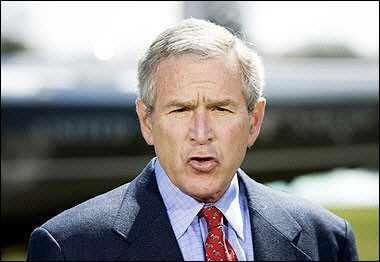US President George W. Bush planned to head to Cleveland, Ohio, as part of
his public relations campaign to defend his Iraq strategy as opinion polls
showed approval of the three-year-old war at a new low.

US President George W. Bush
speaks to reporters on the South Lawn at the White House in Washington, DC. Bush
planned to head to Cleveland, Ohio, as part of his public relations campaign to
defend his Iraq strategy as opinion polls showed approval of the three-year-old
war at a new low. [AFP]
Bush said Sunday he had been informed by US ambassador to Iraq Zalmay
Khalilzad "of the progress the Iraqis are making toward forming a unity
government" three months after national elections were held.
"We are implementing a strategy that will lead to victory in Iraq and a
victory in Iraq will make this country more secure and will help lay the
foundation of peace for generations to come," the president told reporters on
the White House lawn.
But with a mounting Iraqi death toll from bombs and assassinations and the
failure of Baghdad's political leaders to agree on forming a new government, a
top member of Bush's own Republican Party said US policy needs "some new
thinking".
"It's important that we stop this talk about we're not going to leave until
we achieve victory," said Republican Senator Chuck Hagel.
"We need some new thinking here," Hagel told ABC television.
Meanwhile Vice President Dick Cheney and General George Casey, commander of
US military forces in Iraq, said in television interviews they remain optimistic
that a stable democratic society can emerge.
Both also rejected claims by former Iraqi premier Iyad Allawi that the
country has already plunged into civil war.
Cheney told CBS Sunday that ongoing violence only reflects "desperation" by
Al-Qaeda to foment civil war.
"That's been their strategy all along, but my view would be they've reached a
stage of desperation ... They are doing everything they can to stop the
formation of a democratically elected government."
"I don't think they've been successful," Cheney said.
Casey told Fox News that an Iraq civil war was neither "imminent" nor
"inevitable".
"I personally don't believe ... that we're there now (in a civil war)," he
said.
"I believe that as the leadership of this country comes forward, forms the
government of national unity and that begins to move forward ... you'll
gradually see these tensions ebb."